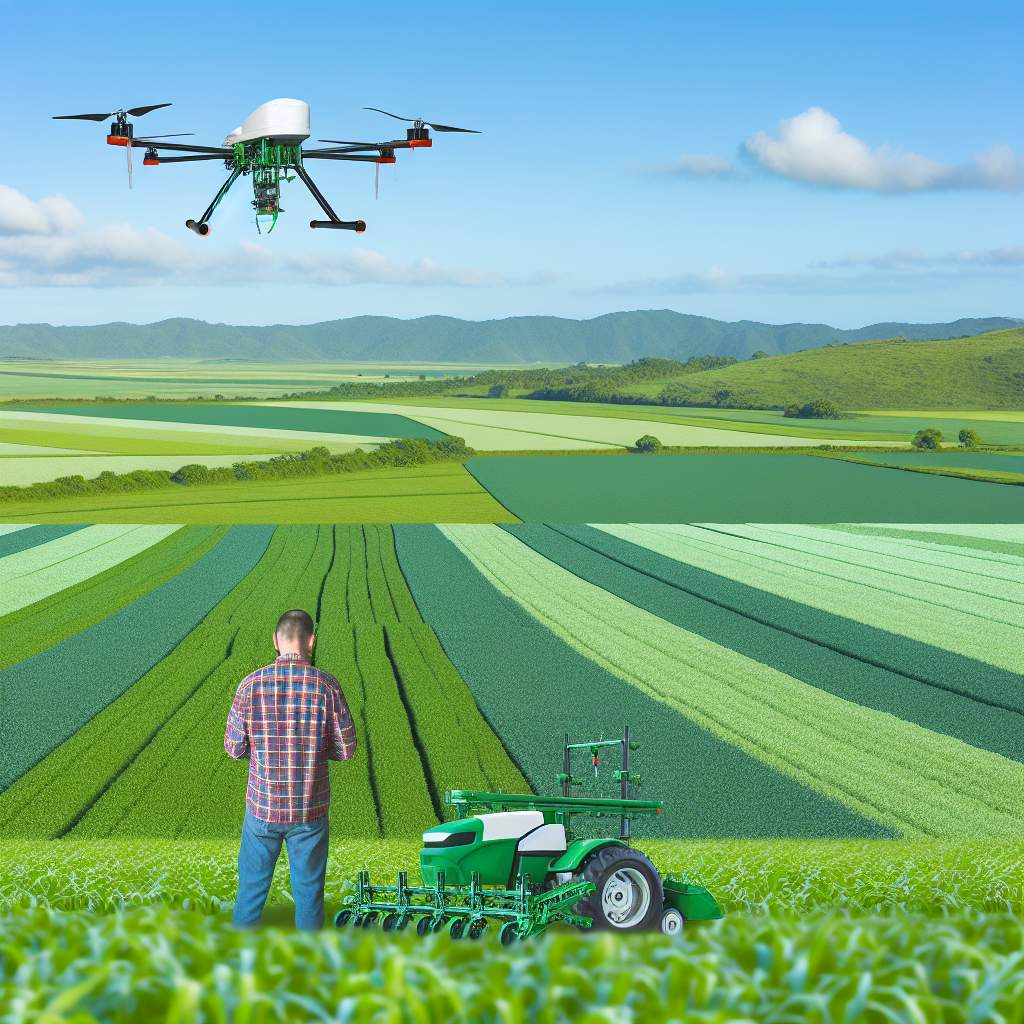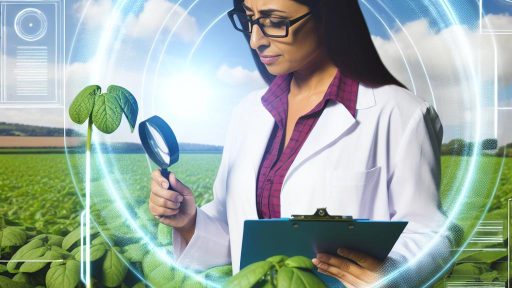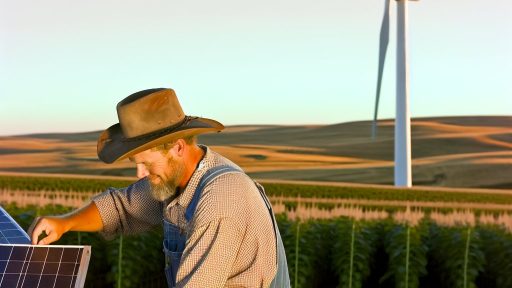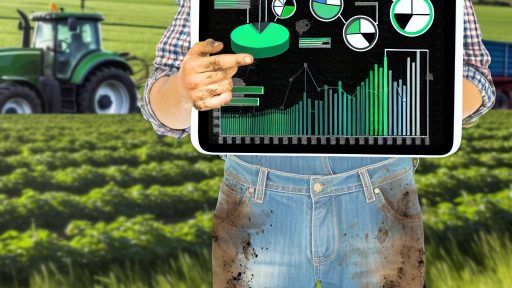Introduction to Precision Agriculture and its Role in Sustainable Farming
Defining Precision Agriculture
Precision agriculture refers to the use of technology in farming practices.
It involves collecting data to optimize crop yields and resource usage.
Farmers can precisely monitor variables affecting their crops.
This includes soil quality, moisture levels, and pest populations.
Benefits of Precision Agriculture
Implementing precision agriculture can lead to sustainable farming practices.
Farmers can reduce the use of fertilizers and pesticides effectively.
This approach minimizes environmental impact and conserves resources.
Moreover, it enhances crop productivity and quality.
Technological Innovations in Precision Agriculture
Technologies like GPS, drones, and IoT devices are vital.
These innovations help gather extensive agricultural data efficiently.
Farmers can analyze this data to make informed decisions.
Consequently, they can apply inputs only where needed.
Challenges in Integration
Despite the advantages, integrating precision agriculture presents challenges.
Initial investment costs for technology can be high.
Additionally, some farmers may lack the required technical skills.
Transform Your Agribusiness
Unlock your farm's potential with expert advice tailored to your needs. Get actionable steps that drive real results.
Get StartedSupport systems and training can mitigate these challenges.
The Future of Sustainable Farming
Adopting precision agriculture shapes the future of sustainable farming.
By utilizing data-driven techniques, farmers can protect the environment.
This approach ensures long-term agricultural viability.
Ultimately, it aims to feed the growing global population sustainably.
Key Technologies in Precision Agriculture
GPS Technology
GPS technology plays a vital role in precision agriculture.
It allows farmers to gather accurate field data.
This capability enhances crop monitoring practices.
Farmers use GPS for field mapping and planning.
Additionally, it supports precision planting with exact spacing.
Farmers can optimize fertilizer application with GPS data.
This reduces waste and promotes sustainable use of resources.
Overall, GPS enhances efficiency and productivity on farms.
Drones in Agriculture
Drones offer a transformative approach to farm management.
They provide aerial imagery for crop health assessment.
Farmers can detect issues like pests and diseases early.
Drones also assist in crop surveillance from above.
This helps farmers make informed decisions quickly.
Moreover, they enable precise application of inputs.
Farmers can target specific areas for treatment.
Ultimately, drones improve both yields and sustainability.
Internet of Things (IoT)
The Internet of Things connects various farming devices.
This connectivity promotes real-time data collection.
Farmers gain insights into soil moisture levels.
Showcase Your Farming Business
Publish your professional farming services profile on our blog for a one-time fee of $200 and reach a dedicated audience of farmers and agribusiness owners.
Publish Your ProfileIoT sensors monitor environmental conditions continuously.
These insights help optimize irrigation practices.
Furthermore, IoT devices enhance livestock management.
Farmers can track animal health and behavior remotely.
This technology supports efficient resource utilization.
In turn, it contributes to sustainable farm management.
Benefits of Integrating Precision Agriculture for Resource Efficiency
Enhanced Resource Management
Precision agriculture optimizes input use across farms.
Farmers apply water, fertilizers, and pesticides more efficiently.
This targeted approach minimizes waste significantly.
Additionally, it improves crop yields and profitability.
Reduced Environmental Impact
Integrating precision technology lowers chemical runoff.
This helps protect local water sources and ecosystems.
Farmers can also manage carbon emissions effectively.
Consequently, sustainability efforts benefit from decreased pollution.
Data-Driven Decisions
Precision agriculture relies on accurate data collection.
Farmers utilize soil and climatic information for better insights.
This data fosters informed decision-making processes.
Moreover, it helps predict crop performance under varying conditions.
Increased Efficiency
Technology streamlines farm operations significantly.
Automated systems minimize labor costs and enhance productivity.
Farmers can monitor multiple fields instantly with real-time data.
This efficiency results in a more profitable and sustainable farming model.
Economic Benefits
Integrating precision agriculture leads to cost savings.
Farmers experience higher profit margins due to reduced waste.
Investing in modern technology yields valuable economic returns.
Farmers can reinvest these savings into their enterprises.
Learn More: Renewable Energy Solutions for Diversified Farms
Data Management and Analytics for Precision Farming Decisions
Importance of Data in Agriculture
Data plays a crucial role in modern agriculture.
Farmers gather data to understand crop conditions.
They also analyze weather patterns and soil health.
This data informs better decision-making.
Types of Data Collected
Farmers collect various types of data.
Soil moisture levels are vital for irrigation decisions.
Crop yield data helps in planning future planting.
Weather data predicts potential challenges and opportunities.
Environmental data monitors ecosystem health.
Tools for Data Management
Farmers utilize diverse tools for managing data.
Farm management software organizes information efficiently.
Data analytics platforms provide insightful analysis.
Remote sensing technologies offer real-time data collection.
Showcase Your Farming Business
Publish your professional farming services profile on our blog for a one-time fee of $200 and reach a dedicated audience of farmers and agribusiness owners.
Publish Your ProfileMobile applications facilitate on-the-go data access.
Analyzing Data for Informed Decisions
Data analysis helps farmers maximize productivity.
Understanding trends enhances crop yield strategies.
It also identifies areas needing improvement.
Farmers can implement precision techniques effectively.
Challenges in Data Management
Farmers face several challenges in data management.
Data collection can be time-consuming and complex.
Inconsistencies in data sources can lead to confusion.
Additionally, interpreting data requires specific skills.
Farmers may need training to leverage data fully.
Future of Data in Agriculture
The future of agriculture relies heavily on data.
Advancements in technology will enhance data collection methods.
Big data analytics will improve forecasting accuracy.
Farmers will increasingly depend on data-driven decisions.
This shift will lead to more sustainable farming practices.
Delve into the Subject: Eco-Friendly Pest Management Strategies for Sustainable Farms
Case Studies: Successful Implementations of Precision Agriculture Worldwide
Australia’s Cotton Industry
The Australian cotton industry showcases effective precision agriculture practices.
Farmers utilize satellite imagery to monitor crop health.
They apply water-saving technology for efficient irrigation.
This strategy has significantly boosted yield while conserving resources.
Precision Farming in Brazil
Brazilian soybean farmers effectively employ precision agriculture techniques.
They make use of GPS-guided tractors for optimal planting precision.
This approach has led to increased efficiency and reduced input costs.
As a result, farmers enhance their profit margins considerably.
Innovations in the United States
In the United States, precision agriculture drives advancements in corn farming.
Farmers apply variable-rate technology to optimize fertilizer use.
This practice minimizes environmental impact while maximizing crop yields.
Consequently, it strengthens sustainability within the agricultural sector.
Adoption in Europe
European farms are increasingly adopting precision agriculture methods.
Countries like France and Germany are leading this shift.
They utilize drones to assess crop health and gather data.
This technology provides real-time insights for informed decision-making.
Marcus’s Vineyard in California
Marcus operates a vineyard in California employing precision viticulture.
He uses soil sensors to monitor moisture levels accurately.
This data helps him make informed irrigation choices.
As a result, Marcus has reduced water usage while improving grape quality.
The Impact of Precision Agriculture
These case studies illustrate the global impact of precision agriculture.
Farmers are enhancing productivity while prioritizing sustainability.
Precision agriculture proves vital for future food security.
Find Out More: Utilizing Drones For Precision Farming Applications
Showcase Your Farming Business
Publish your professional farming services profile on our blog for a one-time fee of $200 and reach a dedicated audience of farmers and agribusiness owners.
Publish Your Profile
Challenges and Barriers to Adoption of Precision Agriculture among Farmers
Financial Constraints
Many farmers face significant financial barriers when considering precision agriculture.
Initial investments for equipment can be prohibitively expensive.
Additionally, ongoing maintenance costs add to their financial burden.
Limited access to financing options can hinder adoption.
Farmers may hesitate to invest without guaranteed returns.
Knowledge and Technical Skills
A lack of knowledge about precision agriculture techniques complicates adoption.
Many farmers may feel overwhelmed by new technology.
Training programs are often insufficient in rural areas.
This knowledge gap can lead to resistance against new methods.
Farmers might rely on traditional practices due to familiarity.
Data Management Challenges
Managing large amounts of data poses a significant challenge.
Farmers often struggle to interpret and utilize data effectively.
Data privacy concerns may also discourage sharing information.
Many farmers lack the tools to analyze data adequately.
This challenge can hinder the effectiveness of precision practices.
Infrastructure Limitations
Many rural areas lack the necessary infrastructure for precision agriculture.
Insufficient internet connectivity can impede data transmission.
Farmers in remote areas may not have access to necessary technology.
Additionally, insufficient support services can limit implementation.
These infrastructure issues amplify the difficulties faced by farmers.
Cultural Resistance
Ingrained farming traditions can lead to cultural resistance.
Many farmers may be skeptical about adopting new methods.
The community’s perception of technology can heavily influence decisions.
Peer pressure and social norms can deter innovation.
Some farmers prefer established methods over untested technologies.
Regulatory and Policy Barriers
Complex regulations can discourage farmers from adopting precision agriculture.
Lack of supportive policies makes it difficult to implement new technologies.
Farmers may face bureaucratic hurdles when seeking assistance.
A clear policy framework can ease the transition to precision agriculture.
Without incentives, adoption remains a challenge for many.
Gain More Insights: Diversifying Revenue Streams In Agricultural Enterprises Successfully
Future Trends in Precision Agriculture: Innovations and Sustainability
Technological Advancements
New technologies are transforming precision agriculture.
Drones now monitor crops from above.
They provide real-time data on plant health and soil conditions.
Additionally, satellite imagery enhances land management strategies.
Farmers can assess crop conditions remotely and accurately.
Moreover, advancements in GPS technology improve planting efficiency.
Farm equipment can now operate with precision based on soil data.
Consequently, this innovation minimizes waste and optimizes yields.
Data Analytics and AI
Data analytics plays a crucial role in modern agriculture.
Showcase Your Farming Business
Publish your professional farming services profile on our blog for a one-time fee of $200 and reach a dedicated audience of farmers and agribusiness owners.
Publish Your ProfileFarmers can analyze vast amounts of data for better decision-making.
Artificial intelligence models predict outcomes based on historical trends.
These insights allow for proactive measures in pest and weed management.
Furthermore, predictive analytics improve resource allocation.
This leads to increased efficiency and reduced environmental impact.
Sustainable Practices
Sustainability is a primary focus in modern agriculture.
The integration of precision agriculture promotes eco-friendly farming.
Farmers use less water and fertilizers through targeted applications.
This method significantly reduces the runoff of harmful chemicals.
Additionally, cover cropping supports soil health and biodiversity.
Integrating livestock and crops also fosters sustainable ecosystems.
Ultimately, these practices contribute to long-term agricultural viability.
Regulatory and Economic Considerations
Regulatory frameworks are evolving to support precision agriculture.
Governments encourage sustainable practices through subsidies and grants.
Consequently, farmers are more inclined to adopt innovative technologies.
Moreover, consumer demand for sustainable products is rising.
This shift influences farmer investment in precision farming tools.
As a result, businesses will need to adapt to maintain profitability.
Collaboration and Knowledge Sharing
Collaboration between stakeholders drives innovation in agriculture.
Farmers, tech companies, and research institutions form partnerships.
These collaborations foster knowledge sharing and best practices.
Workshops and training sessions promote technological adoption.
Farmers benefit from insights offered by researchers and experts.
By working together, the agricultural community can enhance sustainability.
Regulatory and Environmental Considerations in Precision Farming Practices
Understanding Regulatory Requirements
Farmers must comply with local and national agricultural regulations.
These regulations govern the use of technology in farming.
Furthermore, they often include guidelines for pesticide application.
Compliance helps prevent legal issues and environmental harm.
Farmers should stay informed about changing regulations.
Impact of Environmental Factors
Environmental conditions influence the effectiveness of precision agriculture.
Soil type and structure play crucial roles in farming decisions.
Moreover, water availability is a significant concern for farms.
Farmers must assess local climate conditions regularly.
This assessment aids in selecting appropriate farming techniques.
Sustainable Practices in Precision Farming
Precision farming promotes sustainable resource management.
It minimizes waste through targeted application of inputs.
Moreover, it enhances crop yields while reducing environmental impact.
Farmers are encouraged to adopt eco-friendly technologies.
These include soil health monitoring systems and water conservation techniques.
Collaboration with Regulatory Bodies
Collaboration with regulatory agencies is essential for farmers.
Showcase Your Farming Business
Publish your professional farming services profile on our blog for a one-time fee of $200 and reach a dedicated audience of farmers and agribusiness owners.
Publish Your ProfileWorking together ensures adherence to best practices.
Moreover, this partnership fosters innovation in sustainability initiatives.
Farmers should engage in discussions with local agricultural offices.
Such interactions can provide valuable insights into compliance and best practices.
Additional Resources
Climate-smart agriculture (CSA) is an integrated approach to …




